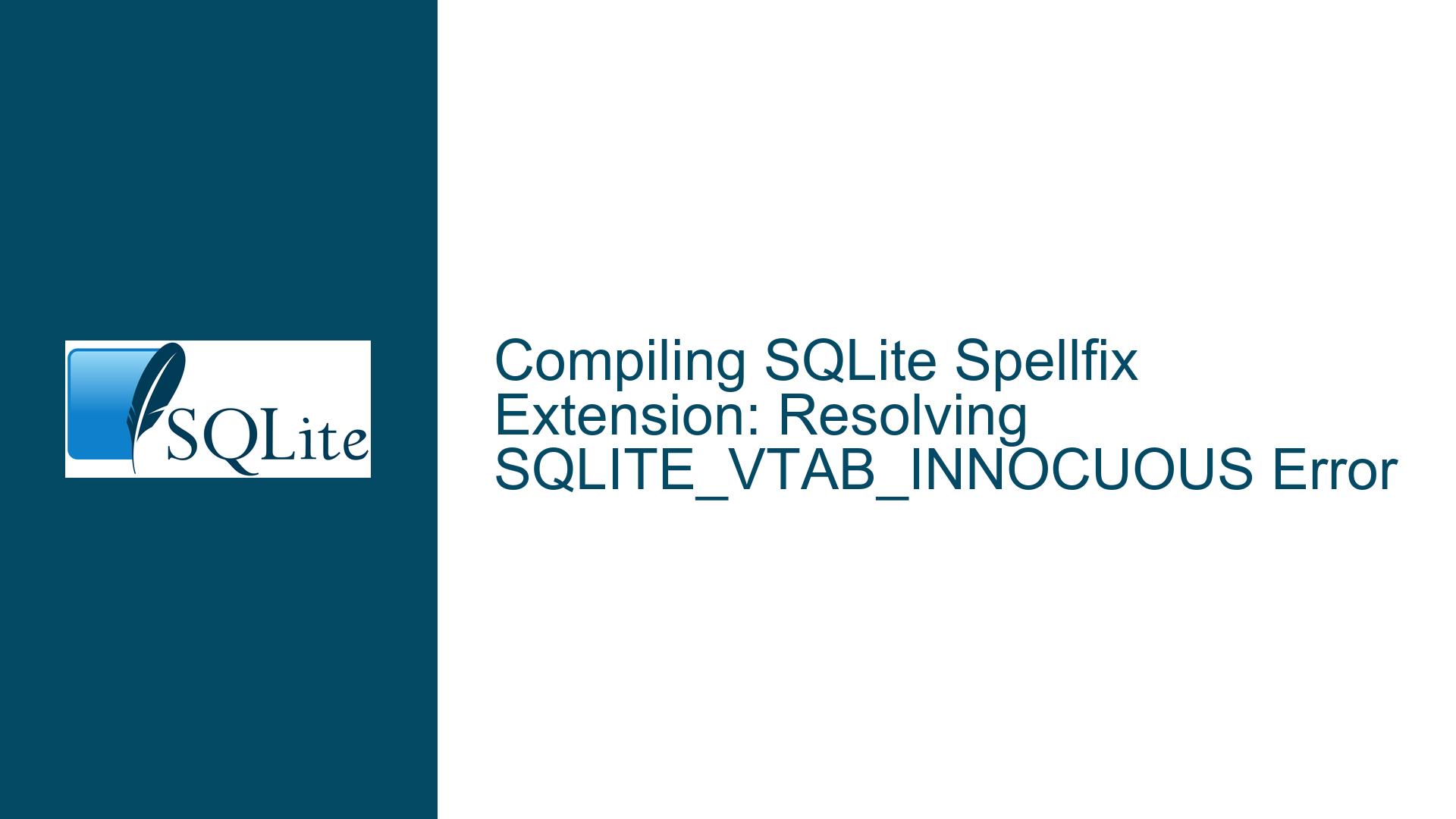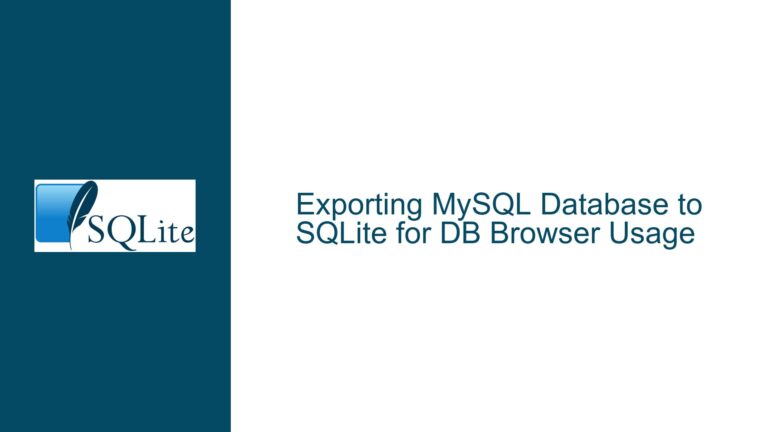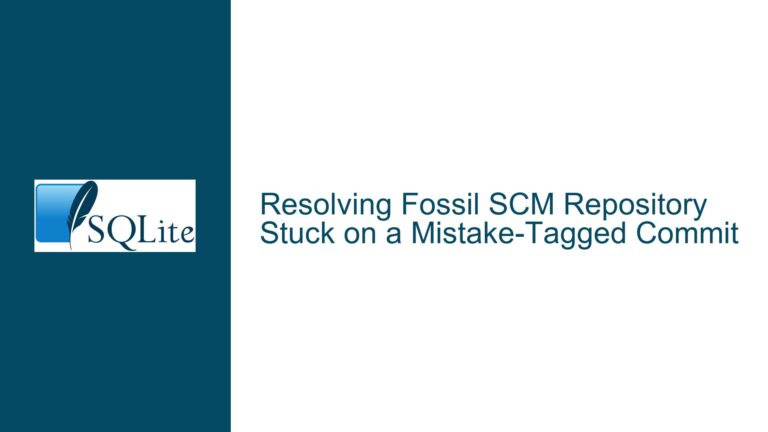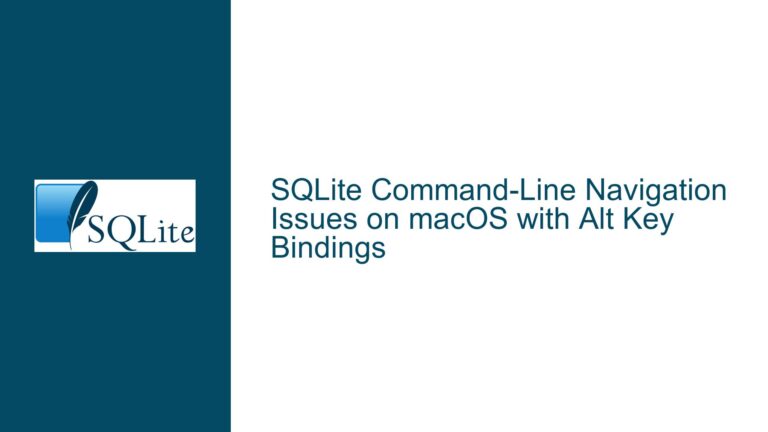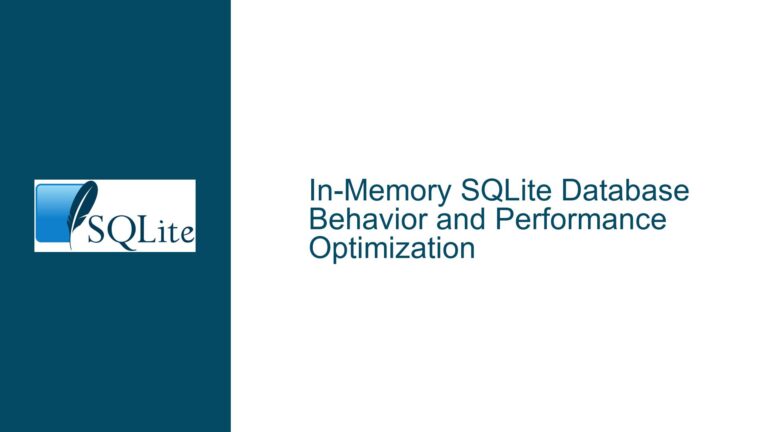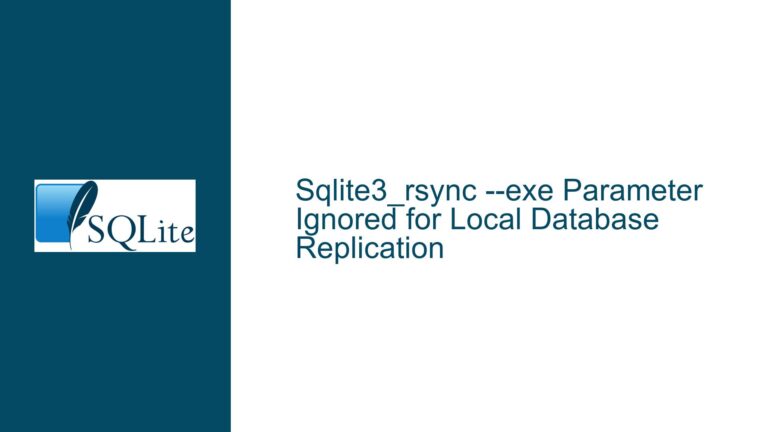Compiling SQLite Spellfix Extension: Resolving SQLITE_VTAB_INNOCUOUS Error
Issue Overview: Compilation Failure Due to Undefined SQLITE_VTAB_INNOCUOUS
The core issue revolves around the failure to compile the SQLite Spellfix extension, specifically when attempting to compile the spellfix.c file into a shared object (.so) file on a Linux (Ubuntu) system. The error message indicates that the pre-processor symbol SQLITE_VTAB_INNOCUOUS is undeclared during the compilation process. This symbol is a macro defined in the SQLite header files, and its absence suggests a mismatch between the version of the SQLite library being used and the version of the spellfix.c source file.
The error occurs because the spellfix.c file references SQLITE_VTAB_INNOCUOUS, which is a feature introduced in a later version of SQLite. The compilation process fails when the compiler cannot find this symbol in the included header files. This issue is exacerbated by the fact that the user is not explicitly specifying the correct header file paths during compilation, leading to the inclusion of outdated or incorrect header files.
The user initially attempts to compile the latest version of the spellfix.c file from the SQLite tarball but encounters the error. As a workaround, they successfully compile an older version of the spellfix.c file (from SQLite version 3.11.1), which does not reference SQLITE_VTAB_INNOCUOUS. However, this is not a sustainable solution, as it relies on outdated code that lacks the security and functionality improvements present in newer versions of SQLite.
The root cause of the issue lies in the improper configuration of the compilation environment, specifically the failure to ensure that the correct version of the SQLite header files (sqlite3.h and sqlite3ext.h) are included during the compilation of the spellfix.c file. This mismatch between the source code and the header files results in the undefined symbol error.
Possible Causes: Mismatched SQLite Versions and Incorrect Header File Inclusion
The compilation error is primarily caused by a mismatch between the version of the SQLite library and the version of the spellfix.c source file. The SQLITE_VTAB_INNOCUOUS macro is a security feature introduced in a later version of SQLite, and its absence in the header files being used during compilation indicates that an older version of the SQLite library is being referenced.
One possible cause is that the user is not explicitly specifying the correct paths to the SQLite header files during compilation. By default, the compiler may be using system-installed header files, which could belong to an older version of SQLite. This is common in environments where multiple versions of SQLite are installed, or where the system package manager provides an outdated version of the SQLite library.
Another potential cause is the failure to properly build the SQLite amalgamation from the tarball before attempting to compile the spellfix.c file. The SQLite amalgamation is a single file (sqlite3.c) that contains the entire SQLite library, along with its header files. Building the amalgamation ensures that the correct version of the header files is available for use during the compilation of extensions like spellfix.c.
Additionally, the user may not be aware of the need to run the configure script before invoking make to build the SQLite library. The configure script generates the necessary build configuration files, ensuring that the correct compiler flags and paths are used during the build process. Skipping this step can lead to the inclusion of incorrect header files or the use of outdated compiler settings.
Finally, the user’s lack of familiarity with the C/C++ compilation process may contribute to the issue. Compiling SQLite extensions requires a basic understanding of how to specify include paths, link libraries, and generate shared objects. Without this knowledge, it is easy to overlook critical steps in the compilation process, leading to errors like the one encountered.
Troubleshooting Steps, Solutions & Fixes: Ensuring Correct Compilation of the Spellfix Extension
To resolve the compilation error and successfully compile the SQLite Spellfix extension, follow these detailed steps:
Step 1: Download and Extract the Latest SQLite Tarball
Begin by downloading the latest SQLite tarball from the official SQLite website. Use the following commands to download and extract the tarball:
wget https://www.sqlite.org/src/tarball/sqlite.tar.gz
tar xzf sqlite.tar.gz
This will create a directory containing the SQLite source code, including the spellfix.c file in the ext/misc subdirectory.
Step 2: Build the SQLite Amalgamation
Before compiling the spellfix.c file, you must build the SQLite amalgamation. The amalgamation is a single file (sqlite3.c) that contains the entire SQLite library, along with its header files. Building the amalgamation ensures that the correct version of the header files is available for use during the compilation of extensions.
Navigate to the directory containing the extracted SQLite source code and run the following commands:
mkdir sqlitebld
cd sqlitebld
../sqlite/configure
make
The configure script generates the necessary build configuration files, and the make command builds the SQLite library. After running these commands, the sqlite3.h header file will be available in the sqlitebld directory.
Step 3: Compile the Spellfix Extension
With the SQLite amalgamation built, you can now compile the spellfix.c file into a shared object (.so) file. Ensure that the spellfix.c file can access the correct version of the sqlite3.h header file by specifying the include path during compilation.
Copy the spellfix.c file from the ext/misc subdirectory to the sqlitebld directory:
cp ../sqlite/ext/misc/spellfix.c .
Then, compile the spellfix.c file using the following command:
gcc -g -fPIC -shared spellfix.c -I. -o spellfix.so
The -I. flag tells the compiler to look for header files in the current directory, where the sqlite3.h file is located. This ensures that the correct version of the header file is used during compilation.
Step 4: Load and Use the Spellfix Extension
Once the spellfix.so file has been successfully compiled, you can load it into the SQLite command-line interface (CLI) and use it in your queries. Start the SQLite CLI and load the extension using the .load command:
sqlite3
.load ./spellfix.so
You can now use the Spellfix extension in your SQL queries. For example, you can create a virtual table using the Spellfix module and perform fuzzy searches on your data.
Step 5: Verify the Correct Version of SQLite
To ensure that the correct version of SQLite is being used, you can check the version of the SQLite CLI by running the following command:
sqlite3 --version
This will display the version of SQLite that is currently installed. If the version does not match the version of the SQLite tarball you downloaded, you may need to adjust your system’s PATH environment variable to prioritize the newly built SQLite executable.
Step 6: Troubleshooting Common Issues
If you encounter further issues during the compilation process, consider the following troubleshooting steps:
- Ensure Correct Include Paths: Double-check that the include paths specified during compilation point to the correct directory containing the
sqlite3.hfile. Use the-Iflag to explicitly specify the include directory. - Check for Multiple SQLite Installations: If you have multiple versions of SQLite installed on your system, ensure that the correct version is being used. You can use the
which sqlite3command to determine which version of the SQLite executable is being invoked. - Rebuild the SQLite Amalgamation: If you suspect that the SQLite amalgamation was not built correctly, delete the
sqliteblddirectory and repeat the build process from Step 2. - Consult the SQLite Documentation: Refer to the official SQLite documentation for additional guidance on compiling loadable extensions and building the SQLite library. The Compiling A Loadable Extension and How To Compile SQLite pages are particularly useful.
By following these steps, you should be able to successfully compile the SQLite Spellfix extension and resolve the SQLITE_VTAB_INNOCUOUS error. This process ensures that you are using the correct version of the SQLite library and header files, allowing you to take advantage of the latest features and security improvements in SQLite.
In conclusion, the key to resolving the compilation error lies in ensuring that the correct version of the SQLite header files is used during the compilation of the spellfix.c file. By building the SQLite amalgamation and specifying the correct include paths, you can avoid issues related to undefined symbols and successfully compile the Spellfix extension. This approach not only resolves the immediate issue but also provides a solid foundation for compiling other SQLite extensions in the future.
